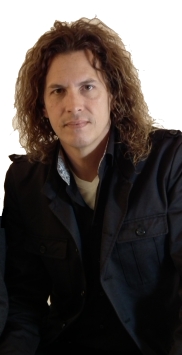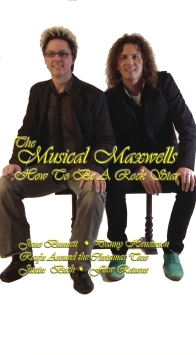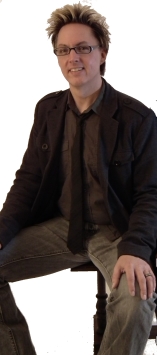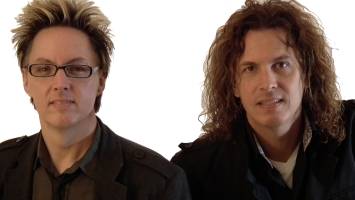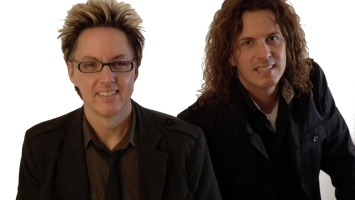social bookmarking tools:
 |
|
| Available RSS Feeds |
|---|
 - Top Picks - Top Picks |
 - Today's Music - Today's Music |
 - Editor's Blog - Editor's Blog
|
 - Articles - Articles
|
Add Louisville Music News' RSS Feed to Your Yahoo!
|
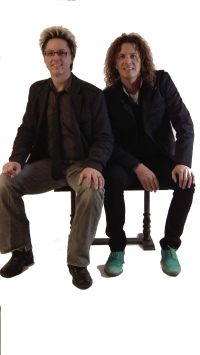
The Musical Maxwells: How to Be a Rock Star
"You guys were amazing on Sunday at 4th Street Live for the ABC show!!! Had a blast!!! We r big fans now :)" -Sarah B., via the Crashers' Facebook page
Max and Mark Maxwell remember well when KISS was The Big Thing. In fact, it was the Destroyer era of the late 1970s when they caught KISS fever, and they would go on to start a teen-age cover band called KISS II. (It was an accurate name, if not terribly original.)
"That was our first real band, to me," said Mark Maxwell, "We did almost an hour of KISS songs - it was really fun."
Mark and Max explained that the group was actually a trio that included a cousin, and they had another friend who played Gene Simmons' part, even though he didn't do anything musically.
"He couldn't play bass, but he could breathe fire," Mark said. "He would put gasoline in this tube, light the end of the tube, and then blow the gas out. Can you imagine how stupid we were?"
Hey, it was an angle. It didn't necessarily have to be about the music, as long as everyone was having fun. That's exactly what the Maxwells are now doing with their latest creation, the Crashers: having fun.
They're also making money and drawing big audiences. These two brothers, who have had their tentacles in the Louisville music scene for nearly 30 years by way of bands (Spanky Lee and many others), merchandise (Mom's Music) and tutelage (Rock School), feel they have it all figured out.
Scoff all you want, you artists and songwriters who suffer for your craft, and whine about being misunderstood or under-appreciated. The Maxwells play "Brown-Eyed Girl" just about every weekend, they have fun doing it, and they pull down five grand a gig. Yeah, that's right: five grand.
And they are losing no sleep over the fact that you just got $65 from the door (after paying the house sound guy $100) to play your originals for 35 people, including your mom and your girlfriend. Why? Because they've worked their butts off to figure out the formula.
The Crashers (formerly the Louisville Crashers) have more than 4,000 Facebook fans - it was over 6,000 before they changed the band name and re-booted their fan page - and they pack shows with dancing, singing, tipsy girls.
But don't fret; the fact is, you're in luck. You say your music career is sagging? You say you can't get people to stop checking their cell phones during your big closing number? Well, the Maxwells are happy to share their secrets. So pull up a chair and sharpen your pencils - you're in for a valuable education.
THE MAXWELL GUIDE TO MAKING MONEY (AND HAVING FUN) PLAYING MUSIC
"You all kicked ass last night. Thanks for the fun and great music." -James. H., via The Crashers' Facebook page
Mark, the long-haired lead singer of the Crashers, is not just a front man - he's a schmoozer, a salesman. He'll learn your name quickly, engage you and make you feel like a friend upon first meeting. He tries his best to bring that quality to the stage when the Crashers strap on their instruments and play - and he says you should, too.
To Mark, it's all about the product, and what it means to the customer (i.e., the audience). He boils it down to three easy aspects:
-
Smile.
-
Groove.
-
Move.
That's it, he said. If you have fun, and you show it, your audience will have fun, too. So what are you doing up there on stage, furrowing your brow to convey how serious your song is, or how broken your heart may be? Why are you staring at your shoes and expecting those 20 or so hipsters to pay more attention to your music than to their Pabst Blue Ribbon tall boys?
"We want the crowd to sing," Mark said, "and we want the crowd to dance. All you have to do is ask them to sing and play the most popular song you can imagine, and they will sing."
You also have to not stand still and stare at the floor, he insists. If you groove to the music you are playing, he reasons, the audience will groove along with you. Getting them to dance is a bit trickier, however; that's why you'll often find Mark off the stage and in the crowd with his microphone. He moves.
"How do you get them to dance?" he said. "You kind of have to be very close to them and break the ice between you and the audience. We're there for them. People will come back every time because they had fun. That's it, they had fun."
This, they say, is especially true if it's a wedding or corporate event. And that's how you get repeat business.
"People will forget what the bride's dress looked like or what the food tasted like or where the damn [wedding] was," Mark said, "but they will remember if they had a good time."
"When people are coming to Louisville for a private event," Max interjects, "and the high point is that first night [when they first see the Crashers], that to me is a great place to be. To be able to take a huge company and [the employees] say, 'Next time we're in Louisville, we gotta go see those guys.'"
Say it with me: Smile. Groove. Move. (Are you writing this down?)
LESSONS LEARNED
The Maxwells aren't preaching; they've been down the same roads other musicians have. Back in 1984, they formed a band called Spanky Lee - it was pop hair metal at its finest, and as Bryan Adams once said, they "tried real hard." They wrote a lot of songs, played a ton of shows over the seven-year run of the band, and even got to open for Cheap Trick.
But like so many bands (and maybe even yours), they never "made it." Hey, it happens. Making it big with your band is kind of like winning the lottery - right place, right time, talent be damned.
They kept writing and playing, of course. They did a roots-rock project called Maxwell in the 1990s which took them to Germany (Screamin' John Hawkins was in that band), followed by a pop-country (with a dash of rock) band in the late 1990s called The Maxwells.
The latter band actually gained a little traction, opening shows for the likes of Blake Shelton, Aaron Tippin and Travis Tritt. Once again, however, the Maxwells couldn't quite get over the hump. It did, however, open a few doors for Max, who has a reputation as being one of the best drummers in town, if not the region. Max's list of gigs over the years is impressive, to say the least.
Some notable names on Max's resume are Greg Foresman, Tim Krekel, Days of the New, Cooler, V Groove and Steve Ferguson and the Midwest Creole Ensemble. He also played the Barnstable Brown Party for five years, which put him on stage with Graham Nash, Michael McDonald, Kid Rock and Chaka Kahn.
"Then I went to Nashville and was working as an engineer," Max said, "and got a job playing with Trace Adkins."
That gig gave him the opportunity to play the Grand Ole Opry at the Ryman Theater.
"Max has played with more bands than any person on the planet," Mark said.
"And everybody was so great," Max adds. "I have been so fortunate. My days with Steve Ferguson were great. I learned so much from Steve about being a musician, about playing grooves, about playing pockets. It was amazing."
Mark, meanwhile, stayed busy playing in a few local bands and leading the music program at Northside Christian Church in southern Indiana. He also has been the man behind Mom's Music's Rock School, which gets young people together and teaches them what it takes to get started as musicians.
Rock School organizes practices, followed by a public gig. Mark said about 30 bands per quarter get started through Rock School.
In fact, teaching is perhaps the most important way Mom's Music contributes to Louisville's music community. Mom's employee (and Crasher guitarist) Howard Gittli told a customer recently that Mom's houses 21 education studios, and provides more than 500 lessons a week. That's a lot of lessons.
Interestingly, a few rumors were floated when the Crashers began four-plus years ago that the band was a bit of a reaction to the sagging sales at Mom's - that the band was a way to make money to save the family business. Mark Maxwell admits times have been tough, but that the store and the band are totally different businesses and are unrelated.
"There is truth in the fact that retail has sucked," he said. "Then you've got the devil [music mega-mart Guitar Center] that moved into town, and that's hard to deal with."
He said the fact is, Mom's has its own niche, and that has helped keep it going. "I think if people said, 'Where are you going to get a vintage guitar?' they'd say 'Guitar Emporium.' If they said 'Where are you going to rent something?' they'd say, 'Doo Wop.' But if you say, 'Where are you going to get music lessons?' It's Mom's music."
Fair points, all. But we've gotten off our lesson.
YOU HAVE TO HAVE A PLAN
It was actually Gittli who suggested putting a band together, which proved to be the birth of the Crashers. But from the get-go, Mark and Max Maxwell wanted to go into it with a plan. The plan, of course, was to have fun while making money. More specifically, they wanted to have fun and to make sure that their audiences had even more fun than the band.
"You guys are fantastic, the best night out I have had in quite some time! Thank you. You can tell that your fans truly matter to you guys.....how refreshing to see such a fun group!" -Jackie W., via the Crashers' Facebook page
Are you paying attention?
"We thought, if we're going to do a cover band, let's be the best cover band we can be, No. 1," Mark said, "and No. 2 is let's make it an actual business. This is the first time we've actually said those words, because we don't know much about business.
"We said, 'Let's start a band that will be fun, [in which] we like the guys we play with, and that we have a really great band that makes money."
Max said the first key is to understand the songs you're playing, and why you're playing them. To do that, you have to truly listen.
"More and more, I read about and listen to interviews with real songwriters, guys who are their own person, write their own material and they're an artist - they are above the rest," he said. "They have studied other people's music and they know everything about it.
"A lot of times learning how to play other people's songs is how you learn how to play The more you do that, the better it teaches you how to be a better listener. Being a good listener is as important as being able to play."
He said the key to the Crashers is that they have been able to take popular songs and make them their own in subtle ways.
Part of that is creating a vibe on stage that people won't forget, and also creating connections. That goes back to the earlier lesson that the more eyes you get in front of, the more opportunity for repeat or new business. Bottom line, you have to leave an impression, even if you're playing a lot of the same songs other cover bands are playing.
"Go down to Kroger and you go to the ketchup aisle and there's all these different kinds of ketchup," Mark said. "You take a paper plate and squeeze a bit of each one of those ketchups on the plate. And then you spin the plate around and dip your French fry in one of them - I bet you couldn't tell which one was No. 1, but the fact is the No. 1 ketchup is Heinz. Why? The answer is marketing."
And it may just be word of mouth. Heck, a couple of years ago a Crashers show was interrupted when the second-story dance floor appeared ready to cave in because of the number of people dancing on it. Sure, it was a scary situation, but it was talked about for weeks, even months, afterward.
The short lesson: Always make it memorable.
"Hey I want to thank you guys again for giving me the opportunity to make that proposal last night magical. I really wasn't expecting a band at the Amphitheater this year but thanks to you guys the whole thing went much better than I had planned =] It's certainly a night Brittany will remember for the rest of her life! You guys rock!!" -David C., via the Crashers' Facebook page
Are you getting this? The bottom line is that you want to dip your French fry in the Crashers, not some other cover band. These guys are rock stars in their hometown, and there's nothing you can do about it.
The Crashers are the Maxwells, Gittli as well as Shane Isenberg (guitar, vocals), Jesse Vest (bass) and Howard's brother Jeff Gittli (sax, flute, keyboards, vocals). They also have a sound man and three roadies. Yes, that's right, they are a cover band with roadies to do all the heavy lifting. Hey, when you're pulling down five grand a gig, you can afford to treat yourself a little.
But it's important to note that each member of the band has his or her specific job. It might be booking or Facebook or marketing, but every player has his role. All too often in bands, it's just one person making the whole thing go, and the other members just show up to play. That can bury a band after a while.
Heck, the Crashers are like a mini corporation - they even read a book about how to find one's best role in a working environment, and that's how they were able to split up the responsibilities. The only thing missing is a 401k (and don't be surprised if that happens down the road).
Not that there haven't been pitfalls - a recent gig at the New Albany Amphitheatre went somewhat awry when the Crashers ended their show early, which was not received well by the promoters.
According to Mark, the contract stipulated that the show was 8-11 p.m., and that the band would play two 75-minute sets. The marquee, he said, read 8-midnight. Mark claims the band was feeling a good vibe onstage - there were a couple thousand people there, apparently - so they played two and a half hours without stopping.
"They weren't very happy with that," Mark said. He didn't want to discuss details, but he said fences were ultimately mended. It was enough of an issue that the band felt compelled to post explanations on their Facebook page as somewhat of an apology to those who showed up late and felt short-changed.
The point to remember is that service recovery is part of marketing. That, and if you sign a contract a year in advance (as the Crashers often do), it doesn't hurt to read it again before you go on stage.
Also, all these Crashers have agreed to play whatever the audience wants to hear; thus the $5,000. They went all in, and agreed not to bicker over the set list.
"We kind of threw our pride out the window," Mark said.
Max noted that '80s hits have been a staple of their act, and get a great crowd response. But they are more than flexible on their song selection.
"With this band, we said, 'Let's not worry about what we do with it, let's do what the people want,'" Mark said. "It's all about our crowd - if they want to hear something, we play it. We ask our Facebook fans a lot what they want to hear. If you are a fan of our band, you have picked most of our set list."
Yes, even the tired cover-band cliché "Brown-Eyed Girl" makes the cut here, and no one complains.
"I'd play 'Brown-Eyed Girl' every night," Mark said. And he probably does.
(OK, whiney singer-songwriter who is too good to play obvious covers: When is the last time you played "Brown-Eyed Girl"? More importantly, when is the last time you made $5,000 for a show? Yeah, that's what I thought.)
The Crashers say they went into the project with a five-year plan; that was to be playing corporate gigs and weddings primarily, and to be making $5,000 for each one if possible. It took them about three years to achieve that plan. Starting in 2013, they will put a new five-year plan into motion. The Maxwells wouldn't discuss it, but the plan is based on financial growth while playing more private shows and fewer shows overall. They understand that market saturation isn't a good thing.
So what have we learned here, kids? Smile, groove, move. Play what the audience wants to hear (and they don't want to hear your boring originals - not in Louisville, anyway). Have a plan. Oh wait, there's a bit more. Pay close attention to the business side of the band.
"When I was in bands before," Mark said, "we spent 90 percent of the time practicing and 10 percent of the time on business. This band works about 80-20 - 80 percent of the time on business and 20 percent of the time on rehearsal."
But wait. There's more. And this is the one you may be hesitant to believe.
"Price yourself out of the market," Mark said. "Eventually, if you believe it hard enough, someone will pay whatever you want. That's the truth - it's a proven fact."
In summary, he said, "I would tell every band, 'You better play for the people, price yourself where you feel like you're worth it, and you better have fun.'"
Now, stop whining that no one gets you, that no one appreciates your art and that no one comes to your shows. Make a plan, find out what the people want, and go out there and just do it.
And have fun.

